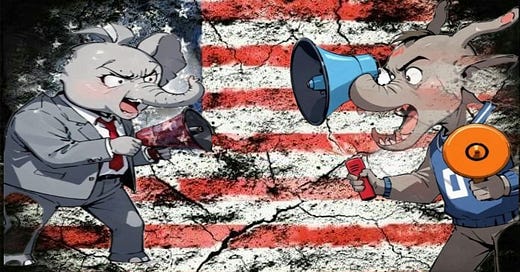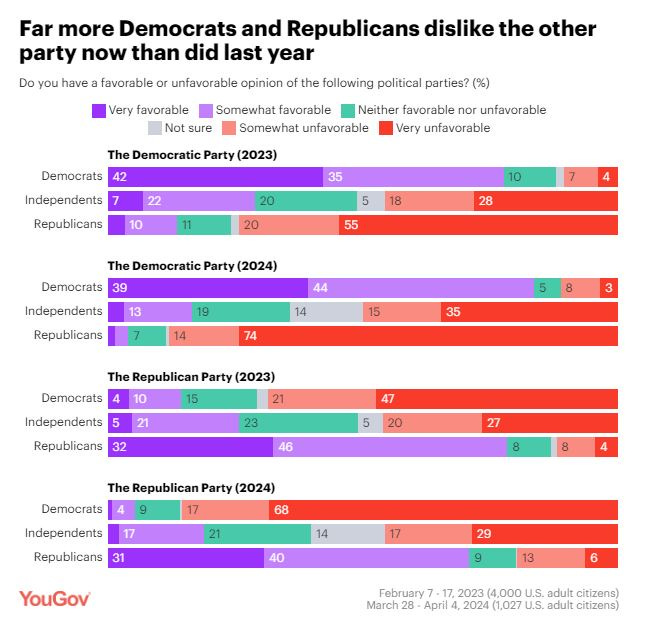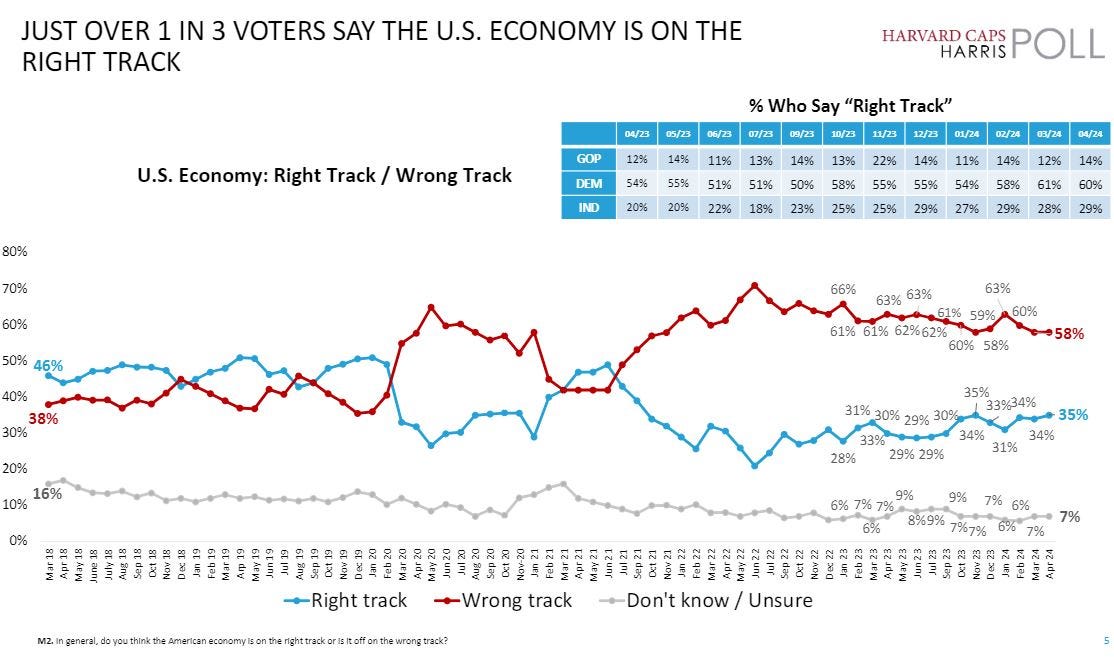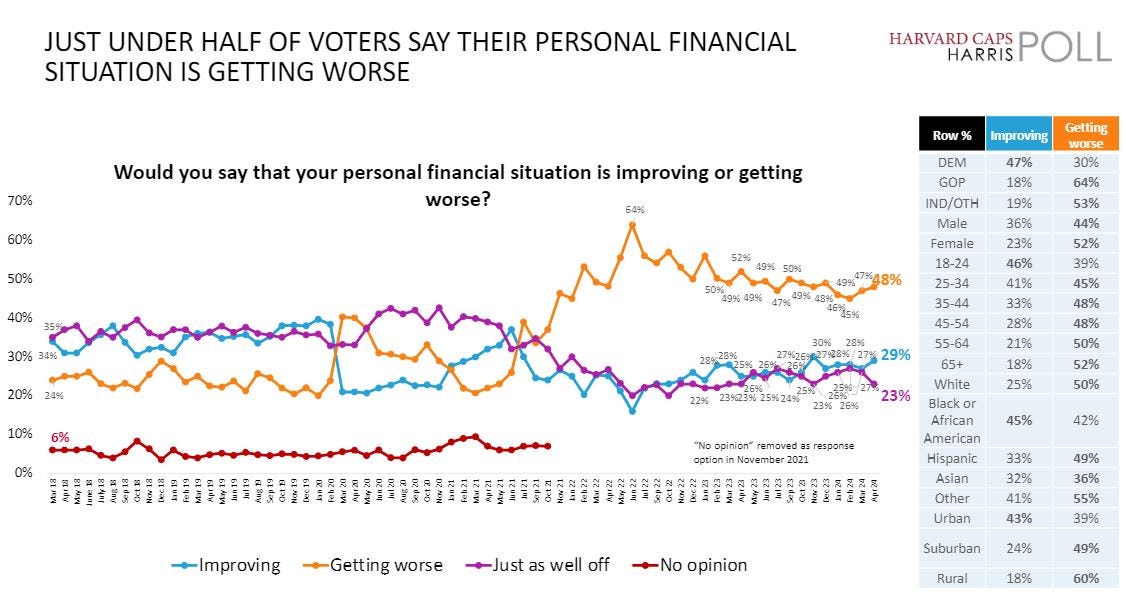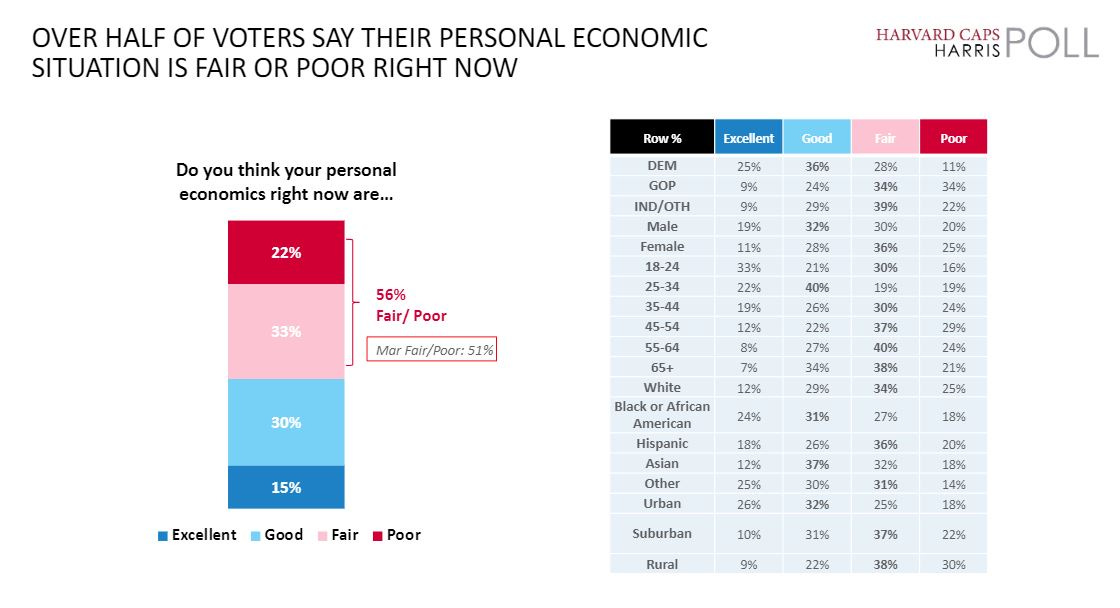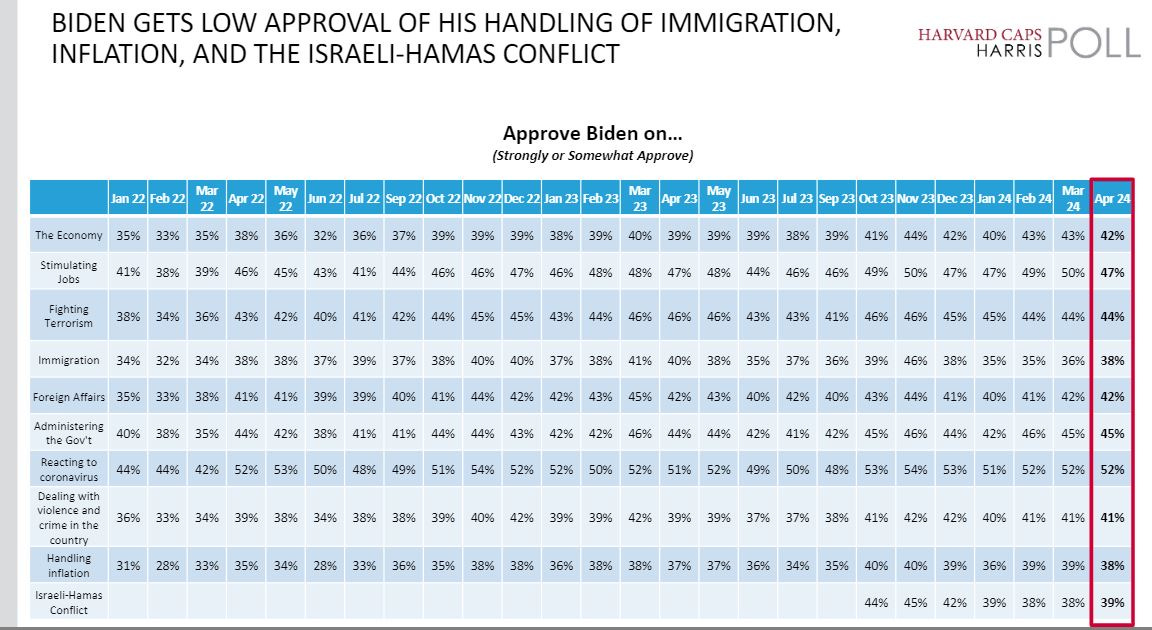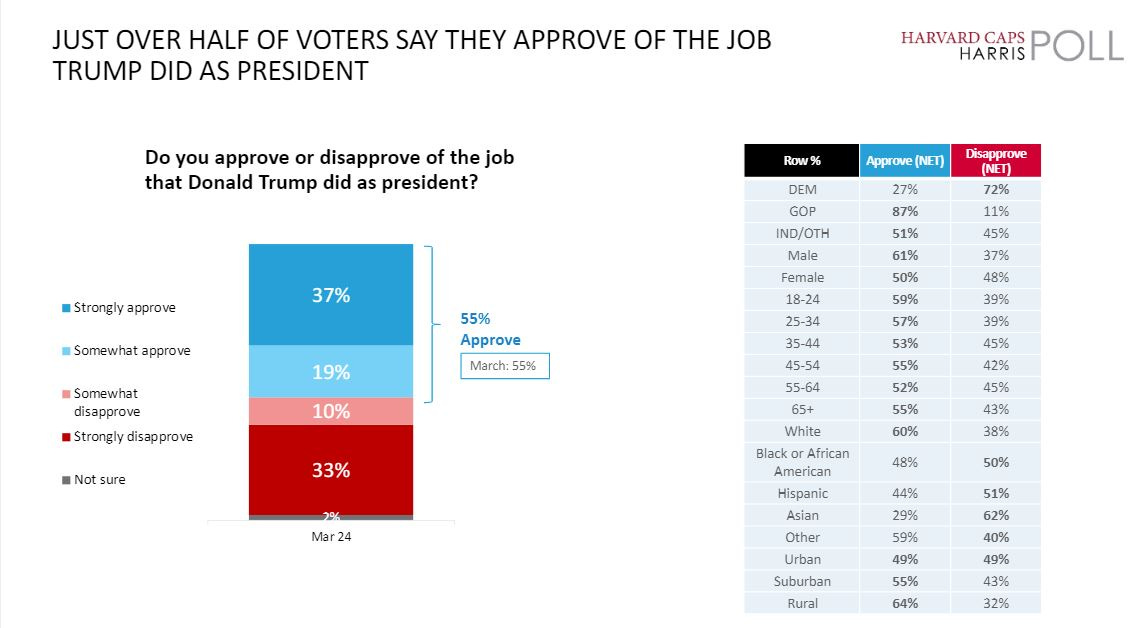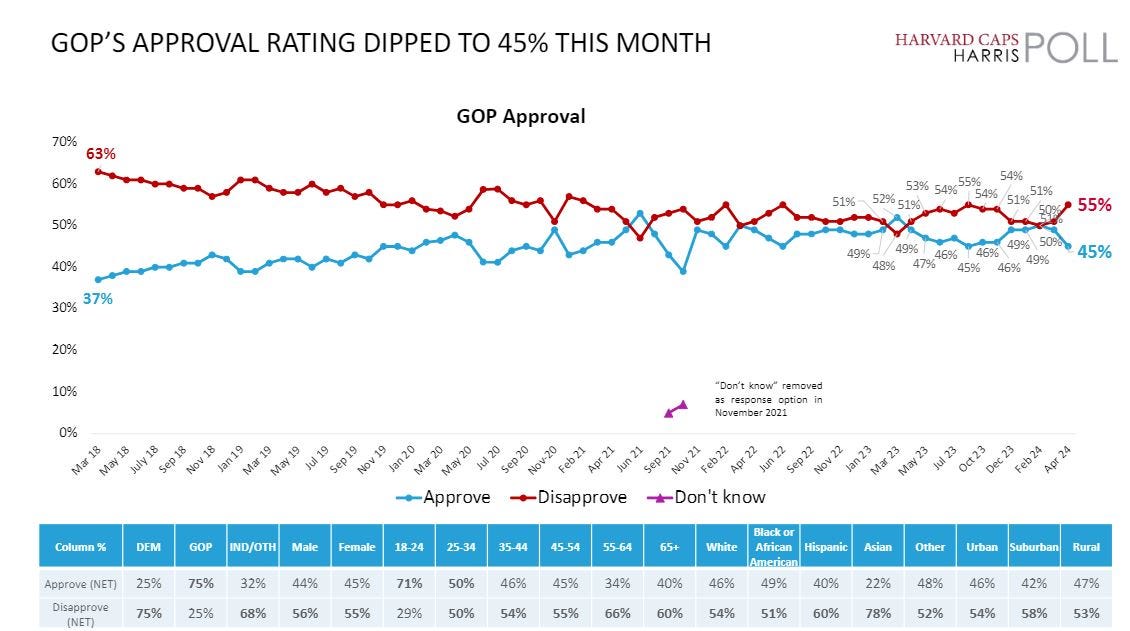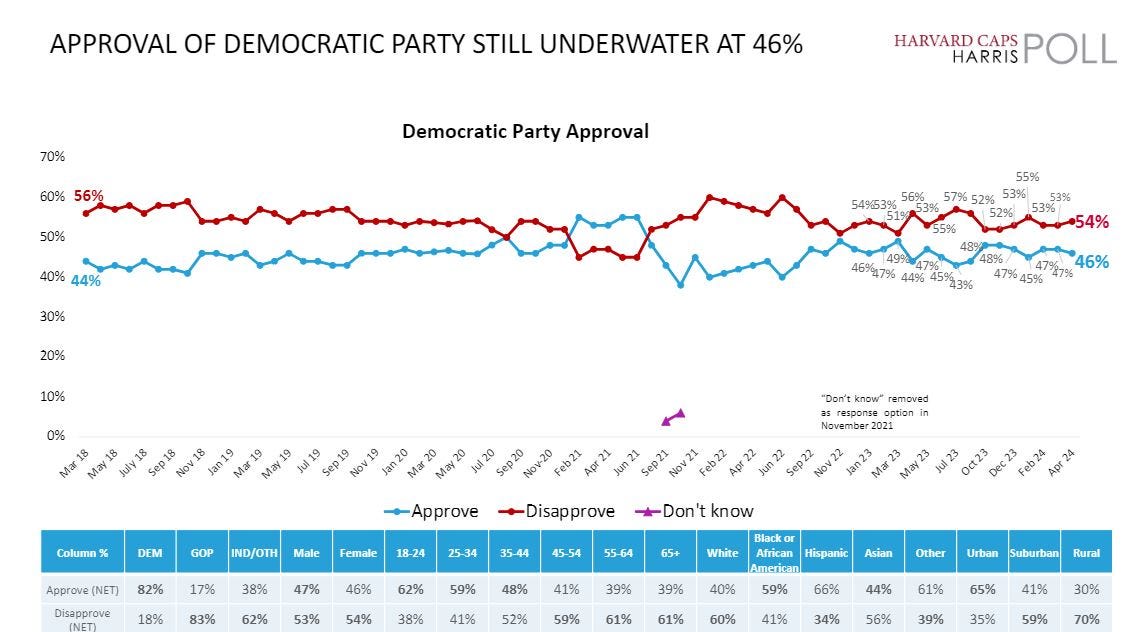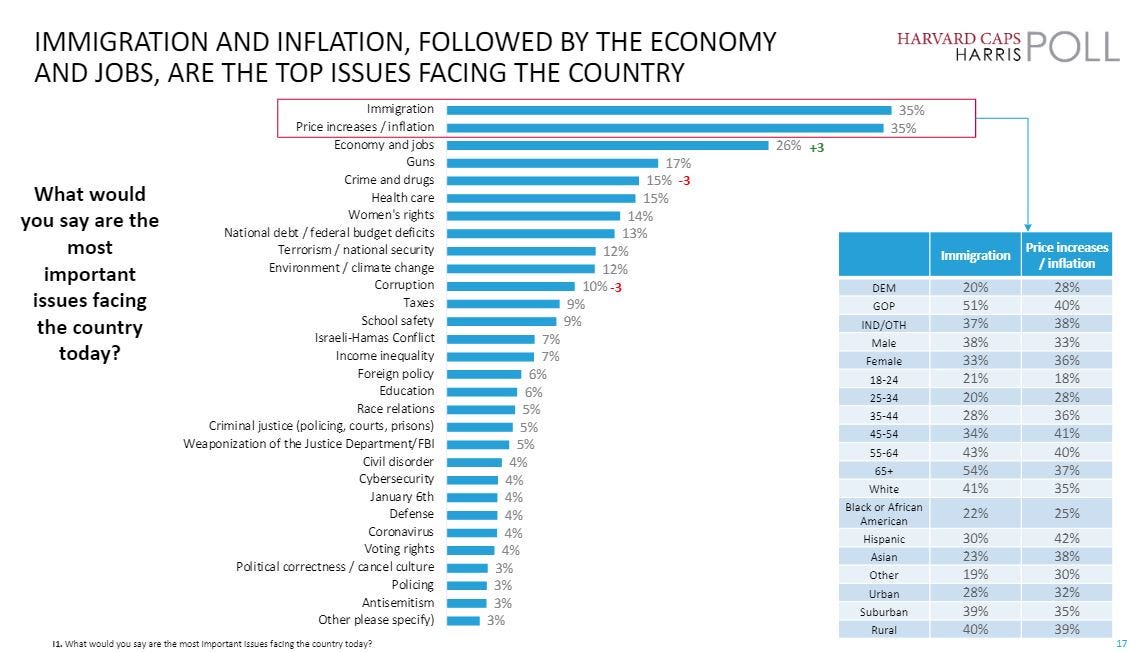US election 2024: democracy can die in twilight not just darkness
US polling guru Frank Luntz once warned Brits 'be thankful you don't have our poison'. And 2024 is set to be the most toxic election yet in postbellum US history
My work is entirely reader-supported. To receive new posts and support my work, please consider becoming a free or paid subscriber
Alternatively why not make a one-off donation? All support is appreciated
The slogan of the Washington Post reads ‘Democracy Dies in Darkness’, but sometimes it passes away in twilight too. Whether we examine US focus groups, behaviour in the House of Representatives, voter insecurities in polling, it’s abundantly clear things are far from a healthy norm.
What’s gone wrong? Looking in the mirror isn’t always a pretty business, and the American electorate - much like our own here in the UK - often detest having to do so. But ultimately, when reflecting on the state of a nation’s cultural and political life, ‘The fault, dear Brutus, is not in our stars, But in ourselves.’
Any explanation as to how the state of America’s civic, cultural and public spheres careened toward terminally ill must include: Loss of trust in institutions, abandonment of assumptions of honest intent, seeing everything in life through the lens of partisan politics and then viewing political opponents as ‘enemies’.
As we enter what will prove the most toxic US Presidential race in postbellum US history, 77% of Republicans insist ‘enemies within’ the US is their biggest concern. 82% of Democrats likewise say the internal threat is the biggest concern over external opponents1. As the scene is set for the two most unpopular candidates in US history to fight it out (again) voters from both sides view each other as the bigger threat, not external enemies like Russia, Putin or China. Welcome to the zero-sum game of contemporary US politics…
Zero-sum politics
Veteran polling guru Frank Luntz has been blunt. When visiting the UK Centre for Policy Studies in 2022 his warning to Brits about the dire state of American politics was stark
“You still like each other, you still respect each other, you still value public debate: your democracy is still functioning,” he insists. “Ours has seized up and I don’t know how to get ours flowing again. Be thankful that you don’t have our poison … I’m very afraid of the American system being hopelessly damaged.”2
YouGov polling documents the shocking rise of antipathy in US political life3. In 2023 47% of Democrats had a “very unfavourable” view of the Republican Party. As we journey through 2024 that has now spiked to 68%.
And Republicans reciprocate, 55% had a “very unfavourable” view of the Democratic Party in 2023, that' figure is now 74%.
Put simply when 74% of Republicans view the opposing party in the most unfavourable terms and 68% of Democrats likewise, it’s easy to see why US voters view the prospects of the opposing side winning the election this year as an “existential threat”.
The estrangement and intra-tribal hostility in the USA has deteriorated to alarming levels even before we get into Trump vs Biden Round II this year.
Polling shows that parents now fear their children falling in love with someone from the ‘other’ side. Almost as if it were Montague vs Capulet, the two parties voters now close ranks as a family against the ‘other’.
In 2023 Republican parents had a net happiness of -20 when asked how they would feel if their child married a Democrat. In 2024 that net happiness score has collapsed to -34.
And Democrat households fear their kids marrying cross-party even more. Net happiness for Democrat mums and dads was -26 when confronted with the prospects of a Republican son-in-law (or daughter-in-law). By 2024 that score has declined to -38.
Be under no illusions this is a house divided. Americans have become so tribal, seeing the opposing side as such an existential threat they can’t even bear the prospect of having one of the other team in their family.
The poison Frank Luntz talked about a few years ago really has hatched out of the mud. Republican and Democrat voter descriptions of this year’s elections can be filed under ‘end of days’.
Lilliana Mason, an associate professor of political science at Johns Hopkin describes matters thusly,
“I don’t think that people are exaggerating. I think it’s that they actually are living in information environments in which it is true for them that democracy is under threat,”
Both sides are being fed a constant diet of exaggeration and live in a media environment approaching hysteria. In the USA more and more voters genuinely and sincerely believe that if the other side wins, it’s the death of ‘their America’.
Democrats fear Trump will do what he says if returned to power. MSNBC and mainstream media pundits constantly pushing the ‘Dobbs and Democracy’ Biden line (democracy on the line as GOP authoritarianism lurks on the horizon, Trump returned equals Trump unleashed etc)
Meanwhile Republicans have been whipped up into a frenzied panic by social media echo chambers, Fox News, News Nation (among others). The polling shows they are increasingly convinced the Democrats are plotting to destroy America and turn it into a socialist or communist state.
The Associated Press-NORC Center for Public Affairs Research poll found that 62% of all American adults say democracy in the U.S. could be at risk depending on who wins next fall. Majorities of Democrats (72%) and Republicans (55%) feel this way.
Trump vs Biden (round II) is seen as existential by both sides, at a time when American’s can barely stand being in a room together. Focus groups display a total refusal to listen to the other side by voters. Their political leaders are scarcely any better, US Senators threaten to assault Labour union leaders live on TV and members of the House Representatives scream abuse in front of the cameras.
The roots of mistrust
Yet I find the aforementioned factors still remain an insufficient explanation of the sheer scale of the rot in the US body politic. We are witnessing levels of polarisation which suggest deeper underlying factors driving this societal breakdown. Today in America your political party has morphed into ‘my team right or wrong’ and the other brand dehumanised to the levels of ‘enemy’ rather than fellow citizen.
Seneca the Younger coined the phrase ‘Pax Romana’ (Roman peace), which subsequent historians have used to summarise the golden age of Roman Imperial expansion 27 BC to 180 AD. Commencing under the Principate of mighty Augustus and concluding with the death of Marcus Aurelius, the last of the “Five Good Emperors”.
It’s a sad reflection of how many things have went wrong since Francis Fukuyama’s ‘End of History?’ was published. I’m old enough to recall Bill Clinton leaving office, bequeathing a budget surplus at the dawn of a fresh century. No bipolarity, merely unipolarity. America triumphant and confident. Exporting its culture to nearly every corner of the planet. Pax Americana at the dawn of the next century.
Today it very much feels as if we’re witnessing the terminal end of that Pax Americana. That golden age initiated by Regan’s ‘morning in America’ seems to have ended as Bill Clinton existed stage left. Say what you like, but George W. Bush and his neo-conservative legacy has poisoned the well and eroded trust with finality similar to Commodus’s reign, which buried the Roman golden age with Aurelius.
Augustus skill - one which makes him legendary - was discovering how to reconcile Romans with peace rather than war. Augustus Caesar inherited a society which had been at war with someone or other almost constantly for 200 years. In 27 BC Roman citizens viewed peace not as an absence of war, but a rare situation when all opponents had been beaten down so utterly they lost the ability to resist4
In the immediate aftermath of the horror of 9/11 deeply cynical actors such as Bill Kristol, Richard Pearle, Max Boote (to name a few) decided to weaponise the tragedy. Unlike Augustus, who sought to reconcile Romans with peace, the neo-conservative gang opted to reacquaint Americans with war. Lots of it.
My next book (currently being written) is about how US foreign policy wrecked Syria and destabilised two regions. But for our purposes today it touches on foreign policy disasters stretching back to the unipolar moment. Policy debacles which cost altogether too much blood and treasure; but also were fought on packs of lies. Lies which have undoubtedly eroded US voter trust in institutions and drives (especially on the MAGA right) a newfound isolationism.
Let me quote an extract from my book draft which I reckon is relevant here.
Bill Kristol via his neoconservative think-tank ‘Project for a New American Century’ (PNAC) had lamented the foreign policy reordering imagined by his ilk would require “some catastrophic and catalyzing event, like a new Pearl Harbor.”(Kristol, 2000, p 51). So naturally, a year later when 9/11 struck, Kristol and the neo-conservatives had their “catalyzing” event, and eagerly began ramping up the calls for war.
Upon reviewing the Bush foreign policy plans in the aftermath of 9/11, Kristol declared his salivating approval, “We've just been present at a very unusual moment, the creation of a new American foreign policy” (PBS “Frontline”, 2003). The plea of Hosni Mubarak not to rashly rush into war had been summarily dismissed. Mr Kristol and the neoconservative gang had their “new pearl harbor”, and set about exploiting the tragedy of 9/11 for their own ambitious ends.
This ‘new American foreign policy’ praised by neoconservatives such as Mr Kristol is best described as “a vision of American civilization as animated by superior virtue” (Rule, 2015, para 5). A neo-orientalist attitude that insisted America had a mission to uplift the backward ‘Arab mind’. Christopher Hitchens – a fellow traveller with neoconservatism – would describe what was required as “revolution from above” (Seymour, 2013, para 6). Itself a telling phrase, which Hitchens would later explain referred to "what colonial idealists used to call the 'civilising mission'” (Seymour, 2013, para 7).
Who are the ‘never Trumpers’? Bill Kristol, the folks at the Bulwark. In short, the neo-conservatives who did so much harm with their lies, cynicism and forever-wars are now the same folk bemoaning the death of the country-club GOP.
Why do a growing number of American’s feel less safe, less rich, more fearful with a heightened sense of ‘threat’ from Muslims (or immigrants of colour more generally)?
Why did Trump so easily take over the GOP? Why did the Bushite establishment find itself so easily overthrown by a TV celebrity buffoon? It’s because of the harmful legacy the unipolar moment left the US in.
In the final year of 2000 Bill Clinton bequeathed a surplus of $237 billion—the third consecutive surplus and the largest surplus ever.5 By the final year of Bush’s presidency of war, that surplus had evaporated, replaced with a deficit reaching a record $458 billion in 2008.6
The neo-conservatives spent the treasury on wars whose casius belli were lies, leaving the US mistrustful and fearful. And poorly equipped to deal with the financial crisis, which was Obama bail out the bankers while they repossessed their homes.
Enter Trump 2016, viewing a landscape where…
GOP establishment: failed
Wall Street: despised by the ‘little guy’
Obama: viewed as a disappointment by independent voters
Trust in institutions: all time low
Parties: deeply divided in the aftermath of the Bush-Obama era. (forever wars, extraordinary rendition, torture memos, Wikileaks revelations, Chelsea Manning, Edward Snowden, drone strike programme etc etc)
2024 state of the race
Now we look at the latest polling about how voters in 2024 see President Biden. Trump, still, retains the advantage. Unbelievably as it may seem to those of us outside of the US political asylum, Trump is associated today with peace rather than war. With stability rather than chaos. And with financial stability rather than debt and insecurity.
Now obviously we may find it incredible that a majority (yes, a majority) of Americans feel this way, but they actually do. Here’s the polling to prove it.
Harris polling…
The latest Harris poll makes for incredibly grim reading for Biden and the Democrats, which I tweeted about.
Perceptions on the economy, coupled with immigration will define the US presidential race. And folks, we need to be worried: Trump might just win this thing.
right track / wrong track
Only 1 in 3 Americans say their country is on the 'right track'.
➡️60% Dems say US is on the right track (meaning, incredibly, 40% don't)
➡️58% of all Americans say US is on the wrong track
economy in focus
Despite the US economy growing well, unemployment low it appears the inflation surges under Biden has left most Americans feeling worse off relative to 2019 (suggesting rose-tinted memories of Trump era)
By way of proof, 48% of Americans insist their personal finances are "getting worse" with only 29% saying "better"
➡️focus on the independents/others, 53% saying worse, these are voters pivotal in deciding if Trump or Biden wins
51% of Americans say their personal economic situation is 'fair' or 'poor'. These are not good numbers given Biden has insisted on talking about 'Bidenomics'. Telling people 'look how good things are' when they feel the opposite only makes you appear detached/out of touch.
To my dying day I would love to know the name of the idiot who looked on US voter insecurity about their finances and slapped Biden’s name all over it. There’s stupid, then there’s mouth breather stupid.
Immigration, inflation, Hamas-Israel conflicts all pulling Biden down
President Biden's approval numbers on key issues are poor. The disapproval of his handling of the Hamas-Israel war could sink him in a tight race if younger voters & Arab-Americans in Wisconsin etc sat away.
This plays into Trump’s strength (he regularly boasts he is the only president who “didn’t start any new wars”). Once again the shadow of the neo-conservative warmongering haunts the US political scene.
Rose tinted memories of Trump
Over half of Americans insist they approved of job Trump did. This is - without a doubt - due to Biden mishandling immigration, cost of living (inflation). It's making folk think more fondly of Trump 'cos in 2019 they felt richer/safer
Brand perceptions aren't helping Dems
GOP aren't popular as a brand...but nor are the Democrats...
'The economy stupid' and inflation and immigration...
Biden is perceived as doing poorly on the top issues American's currently care about. Meanwhile they feel they were richer under Trump (and the southern border was under control then, not now).
The United States of America is deeply polarised, divided and consumed by an internal animosity. Democrat vs Republican in a fight to the death. Both sides - voters and politicians - view the other side as an existential threat. The legacy of the Bush-Obama period of foreign policy failures, lies and moral compromises has left trust in institutions shattered.
And as we enter the 2024 race, independents in critical swing states (and most Americans) feel less safe, less rich and less secure now than under Trump. Regardless of the objective record, this is how they feel. It’s driving their perceptions and it’ll decide who returns to the White House this November.
I recall reading The Atlantic’s 2014 article ‘The Agony of Frank Luntz’, which ruminated on what it meant when America's top political wordsmith loses faith in Americans ability to be persuaded. Today that agony is all of ours, as the leader of the free world careens ever-closer to an extremely dark place.
Marcus Aurelius in Meditations insisted “The object of life is not to be on the side of the majority, but to escape finding oneself in the ranks of the insane”. Perhaps in our new social media age Americans need to heed his warning? Don’t slip so far down your conspiracy thinking that you lose the rope to pull yourself back up.
Otherwise all things end, just like Pax Romana did, with the last of the great Emperors of the golden age, Marcus Aurelius.
My work is entirely reader-supported. To receive new posts and support my work, please consider becoming a free or paid subscriber
Alternatively why not make a one-off donation? All support is appreciated
Park, Jinwan & El Baz, Lama (2024) ‘Americans More Concerned about Threats at Home Than Abroad’, Chicago Council on Global Affairs, Jan 30th, https://globalaffairs.org/research/public-opinion-survey/americans-more-concerned-about-threats-home-abroad
Smith, David, (2022), ‘Be thankful you don’t have our poison’: US pollster Frank Luntz’s warning to UK’ (2022), Guardian, Friday 28th January, https://www.theguardian.com/us-news/2022/jan/27/frank-luntz-interview-pollster-us-uk-politics
McKowan-Dawson, Eli (2024), ‘How do Democrats and Republicans feel about the two parties?’, YouGov, 19th April, https://today.yougov.com/politics/articles/49193-how-democrats-republicans-feel-about-democratic-republican-parties-poll
Momigliano, Arnaldo (1942). ‘The Peace of the Ara Pacis’. Journal of the Warburg and Courtauld Institutes. 5: 228–231. https://www.journals.uchicago.edu/doi/10.2307/750454
https://clintonwhitehouse5.archives.gov/WH/Accomplishments/eightyears-03.html#:~:text=Largest%20Surplus%20Ever%3A%20The%20surplus,pay%2Ddown%20in%20American%20history.
https://www.investopedia.com/ask/answers/030515/which-united-states-presidents-have-run-largest-budget-deficits.asp

